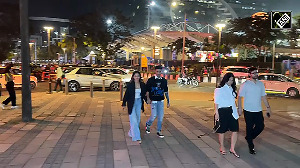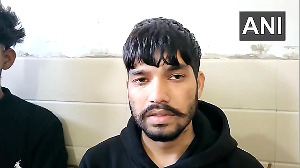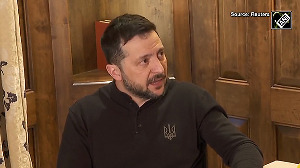The United States on Tuesday started talks with divided and distrustful Iraqis on how to rule the country.
As participants gathered at a US airbase near the southern Iraqi city of Nasiriya, skepticism ran deep among groups united by little other than delight that Saddam Hussein was gone and unease at being seen as too close to the US.
Arabic television channels showed thousands of Iraqis protesting in Nasiriya, chanting: "No to America, No to Saddam."
In a sign of how hard the process may be, one major exile group stayed away and another sent only minor officials to the talks that failed to start as planned at 10am [1130 IST, 0600 GMT].
Three hours later, a spokesman for one group told Reuters by telephone that participants were still preparing to meet.
"A big part of the meeting is getting to know each other, so the meeting starts when they get together," said a US military spokesman.
Ahmad Chalabi, a high-profile leader backed by the Pentagon, did not attend the talks but sent a representative.
The main Shi'ite Muslim opposition group decided not to come at all. "It is not to the benefit of the Iraqi nation," said Abdelaziz Hakim, a leader of the Iran-based Supreme Council for the Islamic Revolution in Iraq. "From the beginning, independence has been our manifesto. We don't accept a US umbrella or anybody else's."
British Foreign Secretary Jack Straw put a brave face on the boycott, saying SCIRI was enjoying its democratic right to choose.
"It is not a one-off. It is the beginning of a process to restore governance," he told a news conference in the Gulf state of Qatar, home to US Central Command war headquarters.
"This is not an American or British operation, but one we have sponsored to get things going," he said, when asked if it would have been better for the United Nations to run the talks.
That question elicited a swipe at UN Security Council permanent members France and Russia, who were opposed to the war.
Straw said London and Washington saw a vital role for the UN, but 'it is the responsibility of all members of the Security Council, but particularly those with vetoes, not to play games but to recognise this new reality and to move forward'.
The UN, promised some sort of role by the US under pressure from Britain, will attend as an observer.






 © 2025
© 2025